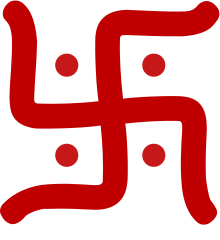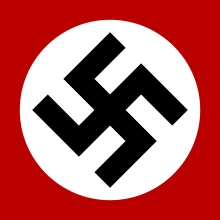swastika
English


Etymology
Learned borrowing from Sanskrit स्वस्तिक (svastika), from सु- (su-, “good, well”) + अस्ति (asti), a verbal abstract of the root of the verb "to be", स्वस्ति (svasti) thus meaning "well-being" — and the diminutive suffix क (ka); hence "little thing associated with well-being", corresponding roughly to "lucky charm". First attestation in English in 1871, a Sanskritism that replaced the Grecian term gammadion. From 1932 onwards it often referred specifically to the version used by the National Socialist German Workers’ Party (also called the "hooked cross", or German Hakenkreuz).
Pronunciation
- Lua error in Module:parameters at line 360: Parameter 1 should be a valid language or etymology language code; the value "RP" is not valid. See WT:LOL and WT:LOL/E. IPA(key): /ˈswɒstɪkə/, /ˈswɒstəkə/
- Lua error in Module:parameters at line 360: Parameter 1 should be a valid language or etymology language code; the value "GA" is not valid. See WT:LOL and WT:LOL/E. IPA(key): /ˈswɑstɪkə/, /ˈswɑstəkə/
Audio (US): (file)
- Lua error in Module:parameters at line 360: Parameter 1 should be a valid language or etymology language code; the value "NZ" is not valid. See WT:LOL and WT:LOL/E. IPA(key): /ˈswɔstɘkɘ/
Noun
swastika (countable and uncountable, plural swastikas)
- (countable) A cross with arms of equal length all bent halfway along at a 90° angle to the right or to the left, used as a religious symbol by various ancient and modern civilizations, but now mainly seen and used in the West (with arms angled to the right) as a symbol of National Socialism and fascism.
- 1888, Rudyard Kipling, “The Sending of Dana Da”, in In Black and White, Folio Society, published 2005, pages 423–4:
- This was signed by Dana Da, who added pentacles and pentagrams, and a crux ansata, and half-a-dozen swastikas, and a Triple Tau to his name, just to show that he was all he laid claim to be.
- 2009, Diarmaid MacCulloch, A History of Christianity, Penguin, published 2010, page 270:
- It is clear from archaeological finds that they enjoyed wearing Christian crosses, though they might enliven these with such symbols as the Indian swastika which Buddhists had brought them.
- (fascism, history, metonymically, uncountable) Nazi rule.
- 1989, Indiana Jones and the Last Crusade, spoken by Dr. Elsa Schneider (Alison Doody):
- "Is that what you think of me? I believe in the Grail, not the Swastika!"
- Lua error in Module:parameters at line 828: Parameter "trans" is not used by this template.
Synonyms
- Black Spider
- (in heraldry): crooked cross, cross cramponned, cross cramponnée, cross cramponny
- cross gammadion, gammadion, gammation
- (chiefly in architecture and heraldry) fylfot
- (chiefly in India referring to the Nazi swastika) hakenkreuz
- hooked cross
- (chiefly in East Asian Buddhism) manji
- (left-facing) sauwastika, sauvastika
- sun wheel
- tetraskelion
- (chiefly in traditional Latvian culture) thunder cross
- twisted cross
Holonyms
- kolovrat (Slavic neopaganism, far-right politics)
Translations
a cross with arms of equal length all bent halfway along at a 90° angle
|
Further reading
Dutch
Pronunciation
Audio: (file)
Noun
swastika f or m (plural swastika's)
French
Noun
swastika m or f (plural swastikas)
- Alternative spelling of svastika
Further reading
- “swastika”, in Trésor de la langue française informatisé [Digitized Treasury of the French Language], 2012.
Categories:
- English terms borrowed from Sanskrit
- English learned borrowings from Sanskrit
- English terms derived from Sanskrit
- English 3-syllable words
- English terms with IPA pronunciation
- English terms with audio pronunciation
- English lemmas
- English nouns
- English uncountable nouns
- English countable nouns
- English terms with quotations
- en:Fascism
- en:History
- English metonyms
- en:Crosses
- en:Nazism
- en:Religion
- Dutch terms with audio pronunciation
- Dutch lemmas
- Dutch nouns
- Dutch nouns with plural in -s
- Dutch feminine nouns
- Dutch masculine nouns
- Dutch nouns with multiple genders
- nl:Nazism
- nl:Religion
- French lemmas
- French nouns
- French countable nouns
- French terms spelled with K
- French terms spelled with W
- French masculine nouns
- French feminine nouns
- French nouns with multiple genders